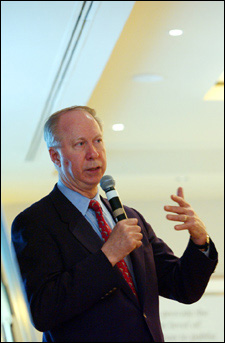What makes good leadership?

The Kennedy School of Government took a long look at what constitutes good public leadership last week and began pondering better ways to teach, foster, and promote that quality in its students.
The discussion took place at a two-day conference at the Charles Hotel sponsored by the Hauser Center for Nonprofit Organizations and the Center for Public Leadership. The conference, called “Leadership 2003: Developing Public Leaders,” featured opening remarks by Center for Public Leadership Director David Gergen, Hauser Center Director Mark Moore, and Kennedy School Dean Joseph S. Nye Jr.
The conference, held Thursday (March 6) and Friday (March 7), featured an electronic town meeting about the Kennedy School’s leadership curriculum as well as a discussion by Kennedy School faculty about the future of leadership. In between were presentations by different outside organizations, such as the U.S. Military Academy at West Point, labor unions, and community service groups.
“The main focus is to have the first conversation about how well we’re doing with this important part of our mission: training leaders for leadership roles in democratic society,” Moore said.
Moore said the Kennedy School has had such discussions in the past, but said it’s important that the School re-examine its core mission and evaluate what kind of job it is doing.
In doing so, Moore said, the School needs to consider whether its leadership courses are effective: whether their subjects are appropriate, whether they are being taught in an effective manner, and whether the entire culture and curriculum at the School supports its main goals.
Moore said the School is examining whether it effectively trains people for leadership in different contexts, including situations where people have power and authority; cases, such as community activism, where they don’t; and situations where people are seeking greater power, such as those running for office.
The Kennedy School’s internal examination is similar to one that took place during the 1990s at West Point, according to Scott Snook, an associate professor at Harvard Business School, a West Point graduate and former professor there.
Snook, Col. Joe LeBoeuf, director of organizational studies at West Point’s Department of Behavioral Sciences and Leadership, and Lissa Young, a West Point graduate and former head of West Point’s core course in military leadership, described the change process at West Point. That process was prompted by the fall of the Soviet Union in 1989 and by subsequent changes to the world political order. The process took the tradition-bound institution – as well known for its hazing of underclassmen as for turning out leaders – through a period of self-examination.
“The treatment handed out by upperclassmen [to underclassmen] is not the kind of behavior that makes good leaders on the battlefield,” Snook said. “The system rewards safe action, rather than creative action.”
The result, Snook said, was an overhaul of the way the institution does business. In the past, the institution focused on training and education, making cadets learn and do the things that were thought important. The development of the individual, Snook said, was almost completely absent, as many discovered on the battlefield when suddenly faced with the need to think creatively and act decisively.
The advantage of shifting the focus toward developing the person and, hence, the officer, Snook said, is that the person leaving West Point possesses a self-awareness and an adaptability that can last a lifetime. Knowledge and skills learned in a more traditional setting, he said, are as perishable as the answers to a chemistry test posed to a student months later.
The West Point experience was just one of several at the conference that provided examples of how different organizations foster leadership in their members. Though those examples were thought provoking, Moore said he didn’t expect the conference to result in recommendations for change. He said the two-day event was meant to spark a conversation at the School that can result in future events and deeper self-examination.
“We’re holding this meeting to create a launch,” Moore said. “We’re here to see where we are when the dust settles. Then we’ll talk about what the next steps will be.”




